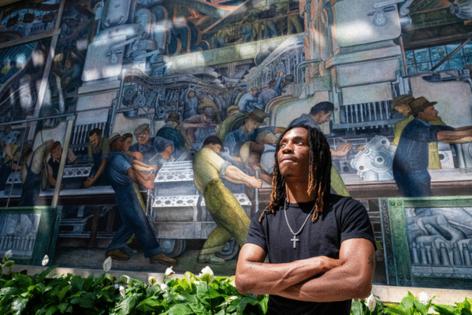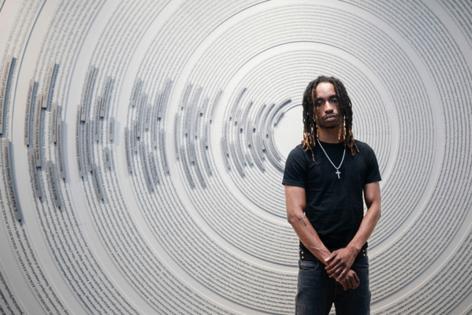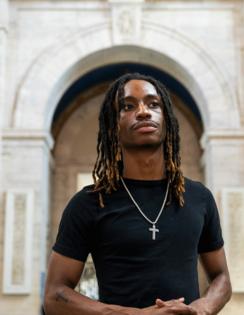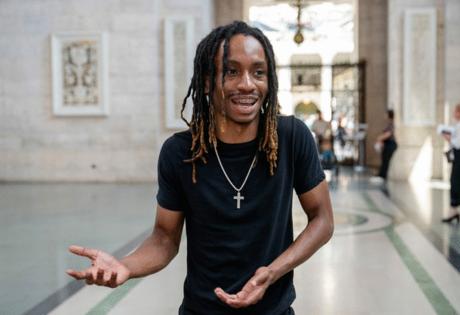'New Detroit' rapper Lelo capitalizes on Gen Z's online sensibilities
Published in Entertainment News
DETROIT — Rapper Lelo stood pondering Diego Rivera's famed 360-degree mural "Detroit Industry."
The grandiose painting envelops the Detroit Institute of Arts' central court, a testament to its enduring stewardship of fine art, its historical weight and the meticulousness of its work. Even in 2025, audiences are impelled to sit with the DIA's art for some time.
But the folks Lelo's music most appeals to seek a different experience, and he's using that to craft a growing niche in the music business. Gen Zers want to scroll, to get information fast, to move on to the next piece — an abrupt turn for a guy who studied oil painting at Albion College. While today's artistic parameters are worrying at times for Lelo (and annoying at others), he's opted for pragmatism.
The 25-year-old Detroit native (legally named Khalil Jewell) has managed to capture the fleeting focus of young audiences by releasing a steady, near-weekly stream of sub-2-minute singles. He employs glitchy, distorted sounds that are in vogue as Gen Z's standards for what's attention-grabbing continually rise. And he posts constantly on TikTok, though he says he'd rather not.
"I ain't never want to do that s—," he said. But it's a tale as old as Rivera and others at the DIA that creatives seeking success must work with the tools — and the times — at their disposal.
"Who am I, as a person who feel like I struggled, who feel like I went through something, if I wasn't willing to use the most valuable resource in front of me, which was the TikTok?" Lelo said.
Musicians niftily using the internet is no new feat. Lelo exists in an era, though, where concerns that art is losing its authenticity have accelerated to a fever pitch thanks to the introduction of artificial intelligence into the creative realm.
He also stands out as a TikTok-era success story within Detroit's storied rap scene — itself on the upswing. As much as his music may be "internet-driven," its Motor City ingredients are pivotal. He calls the fusion "New Detroit," which doubles as the title of his debut full-length album, released late last month. Hometown fans are set to have their first chance at hearing it live on Sept. 14 when Lelo headlines The Shelter at the iconic St. Andrews Hall for the first time.
The Detroit sounds of church bells and lasers serving as percussion, smooth bass lines, up-tempo "ghettotech" drum grooves and flows that meander just off the beat's meter are shot through Lelo's single-heavy catalog. So, too, are routine references to the city's culture.
Calling art cutting-edge is often met with skepticism, especially in the competitive, rankings-obsessed world of rap music. But Lelo's music appears to be captivating audiences, critics and Detroit rap stalwarts alike.
"We are a tough crowd, we do not let s— slide, we don't just let everything through," said Detroit DJ and producer Nick Speed. "But Lelo has created a sound that is very dope."
An 'internet-driven sound'
Lelo's adaptability to audiences in the epoch of scrolling is best exemplified by the mode in which much of his music has rolled out. His debut LP follows years in which the rapper maintained a constant churn of singles, evocative of the assembly line in Rivera's mural.
Tatiana Cirisano, a music industry analyst at MIDiA Research, said that strategy is a good way to gain traction in the "attention economy" — namely, entertainment companies' struggle to reel in and maintain audiences given the abundance of content today.
These days, artists fear that leaving two years between album releases will all but assure audiences forget about them, Cirisano said. Lelo's strategy of "constant releases," by contrast, helps him stay "front of mind for people."
But it's not just the quantity of Lelo's material that's aided his ascent (He sits at 1.5 million monthly listeners on Spotify and 65.3K followers on TikTok). There's also the length of his songs: They rarely eclipse 3 minutes; and several of his most popular don't even hit the 120-second mark, boosting their replay value.
The conciseness is "intentional" for Lelo, who himself doesn't always prefer "listening to s--- that's that long." What's more? Short songs ensure he needn't "force (himself) to say more than what (he) felt was needed to say."
Cirisano said the brevity is clever: It's "a bit more aligned with the way people experience music today, which is often in very quick hits."
Any discussion of Lelo's internet-age savvy, though, is incomplete without mentioning the music itself. Lelo's publicist, Isaac Fontes, described it as an "internet-driven sound."
Take, for example, 2024's "Encore," a blistering affair that clocks in at 1:39. At its outset, a haphazard mirage of sound effects — dogs barking, ammunition shells hitting the ground, money-machine beeps, and unintelligible whispers — plays over a busy instrumental. It's complete with an eerie, high-pitched piano sample on loop, a glitchy hi-hat pattern, and a booming, distorted 808 bass that makes perfectly intact speakers sound on the fritz.
Standing in the Great Hall of the Detroit Institute of Arts, Lelo said with a slight grin that the overblown bass wasn't an original characteristic of the song: "I knew as soon as I heard the beat it had to be boosted. Ridiculous." The chaos is somewhat offset by Lelo's divergently nonchalant flow, which fluctuates between rushing just ahead of the tempo and lagging barely behind.
Social media prowess
Lelo learned early on that social media would be a key ingredient to succeed in music. As he recounted his ascendancy from a "starving artist," recording himself in college, to years later having label support and enjoying glowing reviews from top music magazines, there was a telling turning point.
"I posted a few videos to TikTok and was really, really consistent about it, and one just blew up one day," he recalled.
Among Lelo's earliest videos to crack the algorithm on TikTok was "Stuck Up" in August 2022. It shows him rapping along to the song in a white tiled room. Closed captions of the song — with emojis standing in place for explicit language — flash across the screen. The camera sways back and forth, tracing his subdued movements.
"Shut up n— and let me think. You can call me Da Vinci or Van Gogh, I don't know n— just know I paint," he lip-syncs, seemingly nodding to his studies at Albion. It's a low-budget, do-it-yourself video that exemplifies a widely used formula for aspiring musicians in the TikTok era. It has more than 220,000 views on the app, and over 30,000 likes.
His most viral TikTok post used the same strategy. The 2024 video for "No Contempt" captures Lelo in front of a stately stone building on a cloudy night, donning a baggy gray sweater and long rosary, rapping along to the moody music. The clip, which has crossed 1 million views, feels improvised, though Lelo said there's calculation behind his social media content.
"A lot of that is just studying — I mean, psychology sounds so like a buzzword — but really that's what it was," he said. "You feel me, really studying what I feel like could work to get people's attention, what I felt scenically fit the music." Perhaps not so coincidentally, the track the video accompanied is Lelo's most-played on Spotify, with more than 23 million streams.
His "New Detroit" album seems to open with a celebration of his emergence from the sea of hopeful, young creatives yearning for a slice of internet users' precious attention and into Detroit's popular music landscape: "I see the lights I must have made it out," he sings.
'Indebted' to Detroit peers
Lelo has charted his own path in the music industry. Still, he said he's likely enjoyed the coattails, in some sense, of a broader rise in the popularity of Detroit's rap scene.
He hardly shies away from the association, and the Detroit influences in his music are clear. For one indication, there's the fact that the only guest rapper on a Lelo song is Detroiter Babyface Ray, featured on the 2025 single "On The Wall." (The track's cover shows Lelo wearing his go-to red Detroit Tigers flat-bill).
Speed, the Detroit DJ and producer, pointed to the church bell and laser percussive elements that can be heard across Lelo's beats, as well as their high tempos, as particularly characteristic of the Motor City.
Michigan State University professor Christina Myers, whose research focuses on the intersection of race and media, said "off-beat cadences" are an essential element of Detroit rap.
"Paris" on his new album is among Lelo's most overtly Detroit-inspired tracks. The instrumental has been described in several reviews as "ghettotech," a particularly raw and up-tempo offshoot of Detroit techno.
The rapper's embrace of his city's sounds comes as the style seems to be increasingly creeping into the popular consciousness — with help from the web.
In spring 2020, Detroiter 42 Dugg was featured on a major hit of the pandemic era — Atlanta superstar Lil Baby's "We Paid," which cracked the top 10 of the Billboard Hot 100. Sada Baby's ghettotech jam "Whole Lotta Choppas" went viral that summer, and was later rereleased with a cameo from Nicki Minaj. The streams for Babyface Ray's 2023 song "Ron Artest" were bolstered when Flo Milli's earworm verse over its glossy instrumental gripped TikTok for weeks.
There's also Gmac Cash's song "Lions Won Again," which has spread across Lions Facebook groups and been played atop amateur online edits of the team's highlights, while becoming a rallying cry among fans.
The swell of Detroit rap is something Lelo's grateful for: "The exposure of the culture in the last couple of years has made what I do easy. It created a path for me." While some Detroit artists who've recently hit it big may not be his "direct inspirations," he still feels "indebted to them."
Cirisano, the music industry analyst, said the growing popularity of regional music scenes like Detroit could be seen as enabled by an internet-caused phenomenon called "hyper-fragmentation." The vastness of the internet has enabled people to develop increasingly niche tastes and form more “underground cults." That differs from the MTV days, for example, when audiences all largely saw the same narrow set of stars on their televisions.
At the same time, Cirisano said Gen Z audiences gravitating more to regional sounds could be caused by their desire to “touch grass.”
After coming of age in the pandemic era, passing time in the nebulous, all-encompassing place of the internet, audiences may feel a reactive desire to reconnect with the physical communities close to them.
'Ever-evolving'
Arguing about the factors that drive artists' success — and how their predecessors may or may not have influenced them — is a timeless impulse among music fans.
In the online era, anyone with a social media account has a highly visible platform to broadcast their takes. Indeed, comparisons to his peers on Lelo’s TikToks are myriad.
But the rapper doesn’t mind. He’s learned to cast aside opinions from anyone “who hasn’t lived or been a part of” the culture he’s from. But for the most part, he welcomes the associations fans make between him and peers — those from Detroit and beyond: “Everybody is everybody’s inspiration.”
It’s an attitude that’s illustrative of Lelo’s approach — "this huge amalgamation of my own interests, our own lifestyles, experiences that shaped us, and the s--- that’s synonymous with being from Detroit at the same time.”
As he roamed the DIA, Lelo admitted his fears about creativity today: "I'm so caught up and scared of the death of art, but that's a whole other conversation." When the museum can feel like an artistic vestige, Lelo's inventive approach could be a worthwhile way to keep art thriving:
The "New" part of the "New Detroit" slogan means there can’t be a “concrete definition," he said. “It’s ever-evolving.”
©2025 The Detroit News. Visit detroitnews.com. Distributed by Tribune Content Agency, LLC.




















Comments